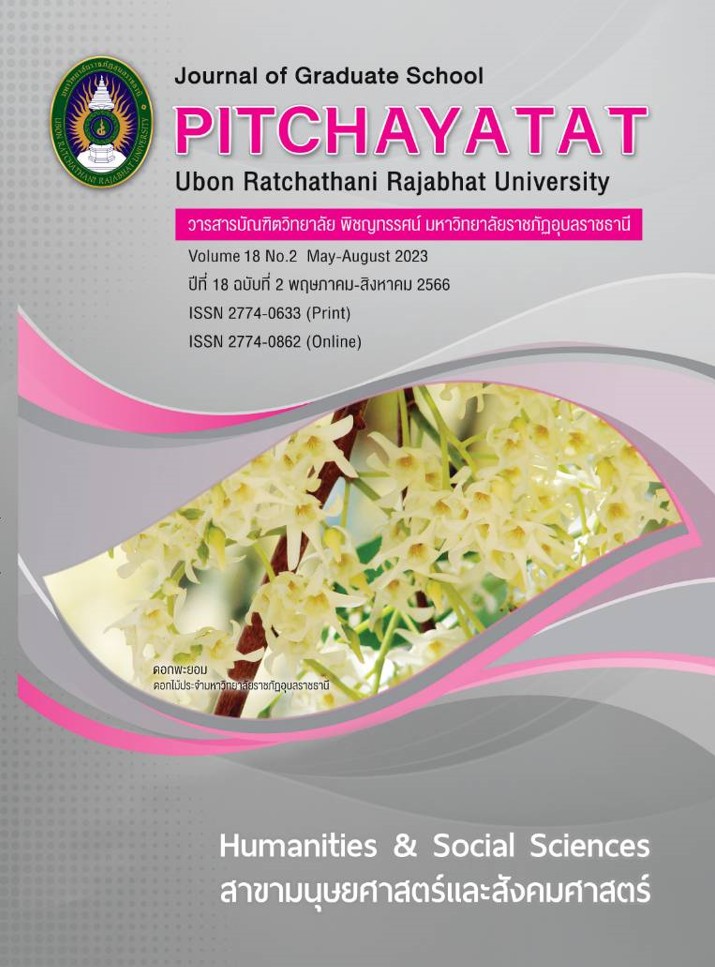สภาพ ความต้องการจำเป็น และแนวทางพัฒนาการจัดการเรียนรู้แบบบูรณาการของโรงเรียน สังกัดสำนักงานเขตพื้นที่การศึกษาประถมศึกษานครพนม เขต 1
คำสำคัญ:
สภาพปัจจุบันและพึงประสงค์ , ความต้องการจำเป็น , แนวทางพัฒนาการจัดการเรียนรู้แบบบูรณาการบทคัดย่อ
การวิจัยนี้มีวัตถุประสงค์เพื่อ 1) ศึกษาสภาพปัจจุบันและสภาพที่พึงประสงค์ 2) ประเมินความต้องการจำเป็น และ 3) พัฒนาแนวทางพัฒนาการจัดการเรียนรู้แบบบูรณาการของโรงเรียน สังกัดสำนักงานเขตพื้นที่การศึกษาประถมศึกษานครพนม เขต 1 ตัวอย่าง ได้แก่ ผู้บริหารสถานศึกษา จำนวน 89 คน และผู้สอน จำนวน 341 คน ได้มาโดยการสุ่มแบบแบ่งชั้น เครื่องมือที่ใช้ในการวิจัย มีจำนวน 4 ฉบับ คือ 1) แบบสอบถามสภาพปัจจุบันของการจัดการเรียนรู้แบบบูรณาการ 2) แบบสอบถามสภาพที่พึงประสงค์ของการจัดการเรียนรู้แบบบูรณาการ 3) แบบสัมภาษณ์แบบมีโครงสร้าง และ 4) แบบประเมินความเหมาะสมและความเป็นไปได้ของแนวทางพัฒนาของการจัดการเรียนรู้แบบบูรณาการ สถิติที่ใช้ ได้แก่ ร้อยละ ค่าเฉลี่ย ส่วนเบี่ยงเบนมาตรฐาน และค่าดัชนีการจัดลำดับความสำคัญของความต้องการจำเป็นแบบปรับปรุง (PNI Modified)
ผลการวิจัยพบว่า
- สภาพปัจจุบันของการจัดการเรียนรู้แบบบูรณาการ โดยรวมอยู่ในระดับมาก และสภาพที่พึงประสงค์ของการจัดการเรียนรู้แบบบูรณาการ โดยรวมอยู่ในระดับมากที่สุด
- ผลการประเมินความต้องการจำเป็นของการจัดการเรียนรู้แบบบูรณาการ โดยเรียงลำดับความต้องการจำเป็นจากมากไปหาน้อย 2 อันดับแรก ได้แก่ ด้านการบูรณาการภายในชั้นเรียน และด้านการบูรณาการภายในกลุ่มสาระ
- แนวทางการพัฒนาการจัดการเรียนรู้แบบบูรณาการ มีผลการประเมินแนวทางพัฒนาโดยรวมพบว่า มีความเหมาะสมอยู่ในระดับมากที่สุด ( x̄ = 4.55) และมีความเป็นไปได้อยู่ในระดับมากที่สุด ( x̄ = 4.51)
เอกสารอ้างอิง
กุลิสรา จิตรชญาวณิช. การจัดการเรียนรู้. พิมพ์ครั้งที่ 2. กรุงเทพฯ: สำนักพิมพ์จุฬาลงกรณ์มหาวิทยาลัย, 2563.
เขตพื้นที่การศึกษาประถมศึกษานครพนม เขต 1, สำนักงาน. คู่มือนวัตกรรม NKP TWO สู่การพัฒนาคุณภาพการศึกษา. นครพนม: สำนักงานเขตพื้นที่การศึกษาประถมศึกษานครพนม เขต 1, 2565.
คณะกรรมการพัฒนาการเศรษฐกิจและสังคมแห่งชาติ, สำนักงาน. ภาวะสังคมไทยไตรมาสสี่และภาพรวมปี 2554. กรุงเทพฯ: สำนักงานฯ, 2555.
ชนาธิป พรกุล. กระบวนการสร้างความรู้ของครู กรณีการสอนบูรณาการ. กรุงเทพฯ: โรงพิมพ์แห่งจุฬาลงกรณ์มหาวิทยาลัย, 2561.
บุญชม ศรีสะอาด. การวิจัยเบื้องต้น. พิมพ์ครั้งที่ 3. กรุงเทพฯ: สุวีริยสาสน์, 2560.
พรทิพย์ ศิริภัทราชัย. “STEM Education กับการพัฒนาทักษะในศตวรรษที่ 21,” วารสารนักบริหาร. 2, 2 (มกราคม-มีนาคม 2556): 49-56.
วไลพร คุโณทัย. ปฏิรูปการเรียนรู้ผู้เรียนสำคัญที่สุด. กรุงเทพฯ: สำนักงานคณะกรรมการการศึกษาแห่งชาติ, 2558.
สิริพัชร์ เจษภาวิโรจน์. การพัฒนาหลักสูตรสถานศึกษา. กรุงเทพฯ: มหาวิทยาลัยรามคำแหง, 2559.
สุพรรณี ชาญประเสริฐ. การจัดการเรียนรู้วิทยาศาสตร์และทักษะที่จําเป็นในศตวรรษที่ 21. สถาบันส่งเสริมการสอนวิทยาศาสตร์และเทคโนโลยี (สสวท.). 42, 185 (กันยายน-ตุลาคม 2557): 10-13.
สุวิมล ว่องวาณิช. การวิจัยประเมินความต้องการจำเป็น. กรุงเทพฯ: สำนักพิมพ์แห่งจุฬาลงกรณ์มหาวิทยาลัย, 2558.
สนธิ พลชัยยา. “สะเต็มศึกษากับการคิดขั้นสูง,” สสวท, 42, 189 (กันยายน-ตุลาคม 2557): 7-10.
อรทัย มูลคำ และคณะ. การบูรณาการหลักสูตรและการเรียนการสอนโดยเน้นผู้เรียนเป็นศูนย์กลาง. พิมพ์ครั้งที่ 6. กรุงเทพฯ: ที.พี.พริ้นท์, 2558.
ดาวน์โหลด
เผยแพร่แล้ว
รูปแบบการอ้างอิง
ฉบับ
ประเภทบทความ
สัญญาอนุญาต
ลิขสิทธิ์ (c) 2023 วารสารบัณฑิตวิทยาลัย พิชญทรรศน์ มหาวิทยาลัยราชภัฏอุบลราชธานี

อนุญาตภายใต้เงื่อนไข Creative Commons Attribution-NonCommercial-NoDerivatives 4.0 International License.
บทความทุกเรื่องได้รับการตรวจความถูกต้องทางวิชาการโดยผู้ทรงคุณวุฒิภายนอกอย่างน้อย 3 คน ความคิดเห็นในวารสารพิชญทรรศน์เป็นความคิดเห็นของผู้นิพนธ์มิใช่ความคิดเห็นของผู้จัดทำ จึงมิใช่ความรับผิดชอบของวารสารพิชญทรรศน์ และบทความในวารสารพิชญทรรศน์สงวนสิทธิ์ตามกฎหมายไทย การจะนำไปเผยแพร่ต้องได้รับอนุญาตเป็นลายลักษณ์อักษรจากกองบรรณาธิการ





